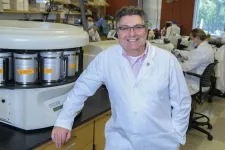(Press-News.org) A University of Colorado Department of Medicine faculty member says she and her colleagues have identified the means in which bacteria in the digestive system can break down tryptophan in the diet into an inflammatory chemical that primes the immune system towards arthritis.
The research was co-authored by Kristine Kuhn, MD, PhD, Scoville Endowed Chair and head of the CU Division of Rheumatology. Several of her division colleagues collaborated on the paper, which was published in February in the Journal of Clinical Investigation.
Tryptophan is an essential amino acid found in many protein-rich foods, including meats, fish, dairy products, and certain seeds and nuts. It has many uses in the body, including helping in the production of proteins, muscles, enzymes, and neurotransmitters – the nervous system’s chemical messengers. The body doesn’t make it; we get it from our diet.
Many people think of tryptophan as the ingredient in turkey that supposedly makes us sleepy after a Thanksgiving feast. In fact, researchers say that although tryptophan plays a role in helping to regulate the sleep cycle, the amount that’s in turkey probably isn’t a significant cause of post-dinner drowsiness.
Cause and effect
Kuhn and her associates set out to learn how a substance that often is a force for good in the body is converted into a pathway to inflammatory diseases such as rheumatoid arthritis, which affects about 1% of the population. It can cause painful swelling of the hands and feet, and joint deformities if left untreated.
"It’s been known that the microbiome – the bacteria in our gut – can break down tryptophan into byproducts. Some of those byproducts are anti-inflammatory, but we’ve also associated some inflammatory causes of those products,” Kuhn says. “We’re the first to highlight which products are contributing to inflammation, and how they are doing that.”
She says the new research “builds upon some observations we had in patients with spondyloarthritis – not quite rheumatoid arthritis, but a closely related condition – where we found that changes in the microbiome were associated with increased production of these products called indoles, which are what bacteria make from tryptophan.” Similar changes were observed in arthritis studies involving mice, she says.
“We put mice on antibiotics to wipe out their microbiome, and they didn’t get arthritis, and they didn’t have indole,” she says. “So we said, OK, what if they do have a microbiome and we put them on a diet with little tryptophan? The microbiome can’t break down tryptophan into indole, and the mice didn't get arthritis. So two different ways, we showed that it’s tryptophan that’s broken down by the microbiome into indole.”
Inflammatory flags
So how does that work? “We found that when indole is present, the mice start to develop autoreactive T-cells that are more inflammatory. They have less of those regulatory T-cells that help maintain balance in the immune system, and they start to develop antibodies that are more pathogenic. We found that the antibodies had flags for being more inflammatory when indole was present.”
The paper concludes that “blockade of indole generation may present a unique therapeutic pathway” for rheumatoid arthritis and spondyloarthritis. That’s all about finding the right path for the body’s tryptophan, Kuhn says.
“If tryptophan hits our body’s cells, it tends to go get broken down into anti-inflammatory products versus when it hits the bacterial cells and goes more inflammatory. The ways we think about how this could lead to therapies are: How do you keep that balance tipped so that tryptophan goes towards that anti-inflammatory pathway? How can you manipulate intestinal bacteria to tip that balance? That's where we’re interested in going in the future.”
Does Kuhn’s research suggest we should be eating differently? “I get asked that a lot,” she says. “A diet that’s rich in plant-based fibers and lean meats – this whole Mediterranean diet – seems to push the microbiome into a healthier state, so that you are getting the anti-inflammatory properties of tryptophan, whereas the typical western diet seems to go more toward the inflammatory pathway.”
As for other ways to protect against arthritis, Kuhn says that through research by her Division of Rheumatology colleagues, “we have started to understand the at-risk stage, where we can actually identify people who are likely to progress to rheumatoid arthritis within the next few years based on blood markers. There’s some data that suggests we could intervene during that period and prevent disease, but we’re not quite sure yet what are the right ways to intervene.”
END
How a common food ingredient can take a wrong turn, leading to arthritis
We need tryptophan to survive, but bacteria can break it down into an inflammatory chemical; a CU Department of Medicine faculty member explores how that process works in new research.
2024-03-08
ELSE PRESS RELEASES FROM THIS DATE:
Children with ‘lazy eye’ are at increased risk of serious disease in adulthood
2024-03-08
Adults who had amblyopia (‘lazy eye’) in childhood are more likely to experience hypertension, obesity, and metabolic syndrome in adulthood, as well as an increased risk of heart attack, finds a new study led by UCL researchers.
In publishing the study in eClinicalMedicine, the authors stress that while they have identified a correlation, their research does not show a causal relationship between amblyopia and ill health in adulthood.
The researchers analysed data from more than 126,000 participants aged 40 to 69 years old from the UK Biobank cohort, who had undergone ocular examination.
Participants ...
New treatment could transform the mental health of children with epilepsy
2024-03-08
A new psychological treatment for children with epilepsy, developed by a UCL-led team of scientists, has been shown to reduce mental health difficulties compared to standard care, a new study finds.
Mental health problems such as worries, low mood and behaviour problems are more common in children and young people with brain conditions such as epilepsy, than in the general population – with up to 60% of those with epilepsy having associated mental health disorders and many having more than one mental ...
Is obesity passed down the generations? Individuals are much more likely to be living with obesity in middle age if their parents were living with obesity, Norwegian research finds
2024-03-08
Is obesity passed down the generations? Individuals are much more likely to be living with obesity in middle age if their parents were living with obesity, Norwegian research finds
Embargo: 2301H UK time Thursday 7 March
*This is an early press release from the European Congress on Obesity (ECO 2024) Venice 12-15 May. Please credit the Congress if using this material*
Individuals have six times the odds of living with obesity in middle age if both their parents lived with obesity at that age, ...
African American patients on Medicaid are less likely to undergo surgery for carpal tunnel syndrome
2024-03-07
Waltham — February 21, 2024 — African American patients with carpal tunnel syndrome (CTS) are less likely to receive surgical treatment, reports the March issue of Plastic and Reconstructive Surgery®, the official medical journal of the American Society of Plastic Surgeons (ASPS). The journal is published in the Lippincott portfolio by Wolters Kluwer.
"Our study shows significant race- and gender-related differences in treatment choices among Medicaid beneficiaries with CTS," comments ASPS Member Surgeon Rachel C. Hooper, MD, of University of Michigan, Ann Arbor. ...
Higher body mass index linked to complications after autologous breast reconstruction
2024-03-07
Waltham — February 21, 2024 — For women undergoing autologous breast reconstruction – reconstruction using the patient's own tissues, rather than implants – the risks of overall and specific complications are increased at higher body mass index (BMI) levels, reports the March issue of Plastic and Reconstructive Surgery®, the official medical journal of the American Society of Plastic Surgeons (ASPS). The journal is published in the Lippincott portfolio by Wolters Kluwer.
"Our study clarifies the impact of high BMI as a risk factor for adverse outcomes of autologous breast reconstruction," comments senior author Merisa Piper, MD, of ...
Best practices suggested for psychiatric care of transgender and gender diverse people
2024-03-07
Waltham — March 7, 2024 — In caring for transgender and gender diverse (TGD) people, psychiatrists should focus on alleviating the sequelae of gender minority stress, with the goal of promoting resilience, according to a review published in Harvard Review of Psychiatry, part of the Lippincott portfolio from Wolters Kluwer.
"We envision a role for psychiatry that goes beyond gatekeeping gender-affirming hormone therapy and surgeries," says Alex Keuroghlian, MD, MPH, Michele and Howard J. Kessler Chair and Director of the Division of Public and Community Psychiatry at Massachusetts General Hospital in Boston, and ...
College of Medicine – Tucson receives $2.7 million grant for diabetes research
2024-03-07
The Juvenile Diabetes Research Foundation awarded researchers at the University of Arizona College of Medicine – Tucson a $2.7 million grant for clinical testing of a novel, oxygen-enabled, implantable pouch containing pancreatic cell clusters that produce insulin.
Type 1 diabetes is an autoimmune disease in which the body makes insufficient insulin, a hormone produced in the pancreas that regulates blood glucose levels. The disease is currently treated with supplemental insulin delivered by manual injection ...
Instruct-ERIC Director Harald Schwalbe welcomes Germany as a member of European Research Infrastructure Consortium
2024-03-07
FRANKFURT. Bettina Stark-Watzinger, Germany’s Federal Minister of Education and Research, emphasizes: "The rapid and successful development of active substances against the SARS-CoV-2 virus illustrated the importance of good and trusting international cooperation among scientists, especially in the field of integrated structural biology. Exchanging information at an international level is crucial, especially when it comes to using specialist infrastructures. There are many advantages to us joining Instruct-ERIC, which ...
Infant health suffered during baby formula shortage
2024-03-07
The nationwide baby formula shortage two years ago forced many parents to involuntarily switch brands or types. A recent survey from researchers at the University of California, Davis, highlights how these substitutions led to undesirable effects for babies, including vomiting. The study was published in the journal Nutrients.
In an online survey of 178 parents whose infants were under six months of age during the May 2022 shortage, 81% of respondents switched formulas, with 87% of those switching because they could not find the formula ...
NJIT Chemist wins Wallace H. Coulter Award for Career Achievements
2024-03-07
NJIT Distinguished Professor of Chemistry Wunmi Sadik has recently been honored with the prestigious Wallace H. Coulter Lectureship during a guest appearance at one of the largest scientific conferences on laboratory science in the world, Pittcon.
The Wallace H. Coulter Lectureship is presented each year at Pittcon to an “outstanding individual who has demonstrated a lifetime commitment to, and made important contributions that have had a significant impact on education, practice and/or research in laboratory science.”
Sadik, chair of NJIT's ...
LAST 30 PRESS RELEASES:
COVID-19 vaccination during pregnancy may help prevent preeclampsia
Menopausal hormone therapy not linked to increased risk of death
Chronic shortage of family doctors in England, reveals BMJ analysis
Booster jabs reduce the risks of COVID-19 deaths, study finds
Screening increases survival rate for stage IV breast cancer by 60%
ACC announces inaugural fellow for the Thad and Gerry Waites Rural Cardiovascular Research Fellowship
University of Oklahoma researchers develop durable hybrid materials for faster radiation detection
Medicaid disenrollment spikes at age 19, study finds
Turning agricultural waste into advanced materials: Review highlights how torrefaction could power a sustainable carbon future
New study warns emerging pollutants in livestock and aquaculture waste may threaten ecosystems and public health
Integrated rice–aquatic farming systems may hold the key to smarter nitrogen use and lower agricultural emissions
Hope for global banana farming in genetic discovery
Mirror image pheromones help beetles swipe right
Prenatal lead exposure related to worse cognitive function in adults
Research alert: Understanding substance use across the full spectrum of sexual identity
Pekingese, Shih Tzu and Staffordshire Bull Terrier among twelve dog breeds at risk of serious breathing condition
Selected dog breeds with most breathing trouble identified in new study
Interplay of class and gender may influence social judgments differently between cultures
Pollen counts can be predicted by machine learning models using meteorological data with more than 80% accuracy even a week ahead, for both grass and birch tree pollen, which could be key in effective
Rewriting our understanding of early hominin dispersal to Eurasia
Rising simultaneous wildfire risk compromises international firefighting efforts
Honey bee "dance floors" can be accurately located with a new method, mapping where in the hive forager bees perform waggle dances to signal the location of pollen and nectar for their nestmates
Exercise and nutritional drinks can reduce the need for care in dementia
Michelson Medical Research Foundation awards $750,000 to rising immunology leaders
SfN announces Early Career Policy Ambassadors Class of 2026
Spiritual practices strongly associated with reduced risk for hazardous alcohol and drug use
Novel vaccine protects against C. diff disease and recurrence
An “electrical” circadian clock balances growth between shoots and roots
Largest study of rare skin cancer in Mexican patients shows its more complex than previously thought
Colonists dredged away Sydney’s natural oyster reefs. Now science knows how best to restore them.
[Press-News.org] How a common food ingredient can take a wrong turn, leading to arthritisWe need tryptophan to survive, but bacteria can break it down into an inflammatory chemical; a CU Department of Medicine faculty member explores how that process works in new research.


